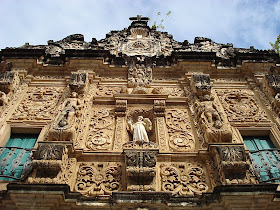And has the distinction of having been the capital of the nation for many more years than either Brasilia or Rio de Jane iro
Back then, the Portuguese empire was nominally, and almost exclusively, Catholic.
A fact which led to the construction of many, many churches.
In the old city of Salvador
Let me show you a few of them.
Over on my other blog, you’ll find an article I wrote back in February of 2010. It's all about Brazilian Wish Ribbons and how they are linked to a certain statue: http://murderiseverywhere.blogspot.com/2010/02/brazilian-wish-ribbons.html
The statue is to be found here, in the Basilica of Our Lord of Bomfim. It’s the most popular church in the city, but it is, by no means, the oldest, or the most beautiful.
The Monastery of Our Lady of Mont Serrat is located on a peninsula extending into the sea and contains some splendid seventeenth century woodcarvings.
The Church of Lady Pelourinho Square
The construction of the building was carried on at night by slaves and free blacks. The black priests of Bahia are always ordained in this church.
The Church of Our Lady of Victory was founded in 1531.
The Church and Convent of São Francisco is considered to be (literally) the jewel of all of the churches in the city. Not so much for the outside…
…as for the interior. The “Church of Gold ”, as it’s sometimes called, is considered to be the most magnificent example of baroque art in all of the Americas
Finally, if you want a great façade, it’s got to be this one:
The Church of the Third Order of São Francisco .
All of these carvings were, for many years, covered with a layer of smoothed stucco.
People had forgotten about what lay beneath.
Then, one day, an electrician was called-in to install some wiring.
Turns out he was drunk, and he had a sledgehammer.
He hit the façade much harder than he’d intended to.
And part of the stucco crumbled away.
I have often lifted a glass in his honor.









Such beautiful architecture, Leighton! Thanks for sharing.
ReplyDeleteThanks, Jean.
ReplyDeleteAnd here's something else I'd like to share with you guys:
I'm chuffed about a splendid review for my entire series that just appeared in the Wall Street Journal:
Wall Street Journal
Great review, Leighton! (You'll have to buy a larger hat.) I look forward to reading the book.
ReplyDeleteGreat reviews, Leighton. And I love the photos of the churches. I'm glad I have such well-traveled writing friends so I can experience it all vicarously!
ReplyDeleteGreat article and beautiful pictures.
ReplyDeleteJaden and Jackie,
ReplyDeleteI'm glad you enjoyed the pics. And may you both get a chance, someday, to visit the churces in person.
Believe me, they're worth it.